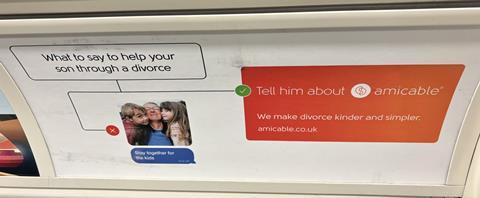Divorce is being presented as a “kind” option on adverts spotted on the London tube, but Glen Scrivener says trampling across the sanctity of marriage in the service of mere convenience is far from kind

It’s not very “on brand” for me - a single word post on X (better known as Twitter).
“Evil” I typed and hit send, having just photographed a new London Underground advertisement for Amicable, an online service which boasts: “We make divorce kinder and simpler.”
Evil. pic.twitter.com/GHLdnnEAHU
— Glen Scrivener (@glenscrivener) December 10, 2024
Was “evil” the right word to use? I don’t know. That’s what this article is about - inviting you into my tangled thoughts as I try to process it all. Lucky you!
The ad is presented as a simple flow chart. We begin with a question: “What to say to help your son through a divorce”. Option 1 takes you to a family picture: grandma with the two children. It’s captioned with the text “Stay together for the kids.” That’s what grandma could send her son. But that option is rejected, a red cross placed next to it. Instead grandma, (as well as all the other commuters on the Northern Line), are encouraged to take option 2: “Tell him about Amicable.” There is no picture associated with option 2. There’s just a “kind” and “simple” solution: divorce.
What struck me, almost physically, was the tragic beauty of option 1 - the family scene in the picture - coupled with the cold simplicity of the decision tree. Option 1 is wrong, apparently, however right it looks. Option 2 is approved. Like a Disneyland ride, we are carried past the family installation, glimpsing it briefly, before the track takes a sudden turn and we are plunged down into a different reality. And all the signage reassures us we’re doing the right thing as we are led inexorably away from the commitment of marriage and the bonds of family.
Follow these simple steps, say Amicable. A solution is at hand. Resist the pull of family - resist it from your mother, resist it from your son and daughter, resist whatever pull may remain from your wife. Instead, expedite the divorce. It’s kinder. It’s simpler. Make a clean break, we’ll take care of it all.
Let me affirm some vital truths: I believe there are biblical grounds for divorce. There are tragic circumstances where it is permissible, and there are terrible circumstances where separation is the right thing. I would be thrilled if they replaced this poster with advertisements for a domestic violence hotline or a women’s refuge. But this ad is not offering a wife escape from an abusive man, it’s offering a man an easier way to divorce his wife, splitting his family in two. And as we’re offered this frictionless user experience, the faces of those children stare back at us.
That’s where my visceral reaction - “Evil”- came from. It’s not a word I use lightly and maybe it was misjudged. I’m well aware that “the outrage machine” (aka social media) is forming us and mostly in negative ways. I may yet delete the post. It sounds cruel, perhaps like it’s an angular culture-war intervention, bound to hurt those bruised by difficult marriages and their breakdowns. But for now I’m leaving it up because I believe, for all its angularity and potential to be misunderstood, we need a more robust definition of kindness.
We need to be able to spot when “kindness” is a mask for something darker
Amicable have claimed the word “kindness” for themselves. Of course they have. In modern Britain we cannot propose anything without claiming it as the “kind” option - whether it’s divorce or assisted dying or abortion or anything. No matter how it tramples across the sanctity of life, or the sanctity of marriage, no matter how many suffer in the service of autonomy and convenience, it’s always presented as a kindness.
Why the insistence on this value? My 2022 book attempts an answer. In The Air We Breathe: How We All Came to Believe in Freedom, Kindness, Progress, and Equality, I lay out our Christian foundations in the West. But I also point out the post-Christian counterfeits. We need to be able to spot when “kindness” is a mask for something darker. That’s why I used “evil”, to shock us into a different perception of “kindness”-speak. In truth, it’s the old-fashioned ‘sanctity of marriage’ that is kindest. It’s the modern worship of choice that is cruel.
Marriage, the way Jesus taught it, is not easy. It’s incredibly hard but it is the most compassionate arrangement of family in history. There are many ways in which Christian marriage and Christian marriages go wrong. But as Churchill said about democracy, it can be the most flawed arrangement barring all the other ones. Its central virtue is to strongly tie men to their wives and tie them to their children. It refuses to offer us an easy way out. Biologically a man can father a child and move on. Around the world and down through history that has been the all-too-common pattern: men uncommitted to their women and uncommitted to their offspring. But Jesus came preaching a unique vision for marriage and singleness (Matthew 19:1-12). It was incredibly tough but wonderfully kind.
the old-fashioned ‘sanctity of marriage’ is kindest. It’s the modern worship of choice that is cruel
Essentially the teaching is this: the one flesh experience of sex belongs in the one flesh union of marriage, and nowhere else. It’s one man and one woman for life. The men who heard Jesus were scandalised: “If this is the situation between a husband and wife, it is better not to marry.” (v11). Jesus offers the unmarried just one alternative: chaste singleness in the service of the kingdom. What he doesn’t do is give the disgruntled husbands “Option 2” and call it “kinder” and “simpler.”
Escaping responsibility is certainly common, it might be “simple”, and perhaps I shouldn’t have called it “evil”. But I don’t think anyone should call it kind.







































2 Readers' comments